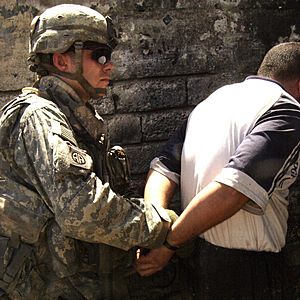Arrest facts for kids

An arrest is when a person's liberty is removed. This is usually done after an investigation of a crime or in stopping a crime from taking place. The term comes from Anglo-Norman. It is related to the French word arrêt, which means "stop".
Police and some other organisations are allowed to arrest people. In some places, normal people can arrest others. For example, in England and Wales, any person can arrest "anyone whom he has reasonable grounds for suspecting to be committing, have committed or be guilty of committing an indictable offence", which means that anyone can arrest another person when they have a good reason for thinking the other person has committed a crime. However, certain conditions must be met before this can be done.
Contents
Where the word comes from
The word "arrest" comes from Anglo-Norman. It is taken from the French word arrêt. Arrêt means 'to stop or stay'. There are many slang terms for being arrested in different countries. In British slang, the term "nicked" is often used to mean "arrested", and "nick" can also mean a police station. In the United States and France, "collared" is sometimes used. The term "lifted" is also used.
The way arrest is done
United States
When there is a good reason to think someone has committed a serious crime, the police usually handcuff an arrested person. The person will be taken to a police station or jail. There, they can be bailed or have their charge read out to them and asked how they plead. This is called an arraignment.
India
Indian law says that arrests do not need to be formal. The arrest can be made by a normal citizen, a police officer or a Magistrate. The police officer needs to tell the person who is being arrested what they did wrong and that they can be let go on bail if the crime allows people to be bailed.
Warnings
United States
A Miranda warning is only needed when a person has already been arrested is being questioned. This warning tells the person who has been arrested that they can be silent, can have a counsel with them, and warns them that whatever they say can be used against them. Police also must tell the person who has been arrested about their Miranda Rights.
United Kingdom
In the United Kingdom a person must be told that they are under arrest. They must also be told, in simple language that they can understand, the reasons for their arrest. A person must be 'cautioned' when they are arrested unless this can not be done, for example if the person being arrested is being violent. The caution given in England and Wales is:
You do not have to say anything, but it may harm your defence if you do not mention when questioned something which you later rely on in court. Anything you do say may be given in evidence.
This exact wording is not needed as long as the same information is given.
Related pages
Images for kids
-
A man arrested by U.S. Immigration and Customs Enforcement (ICE) agents
-
American socialist activist Lucy Parsons after her arrest for rioting during an unemployment protest at Hull House in Chicago, Illinois, 1915
See also
 In Spanish: Arresto para niños
In Spanish: Arresto para niños



